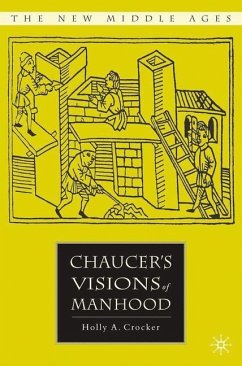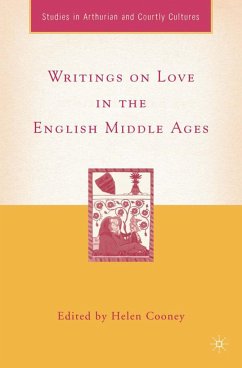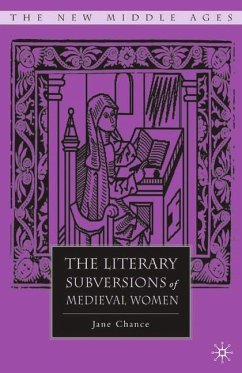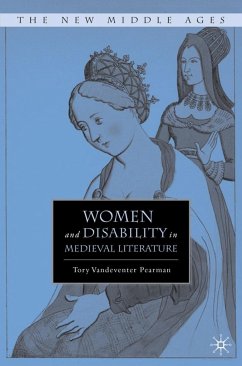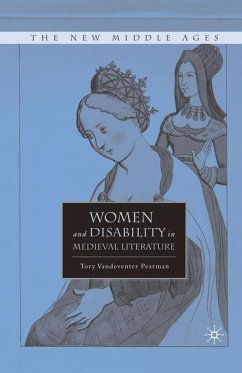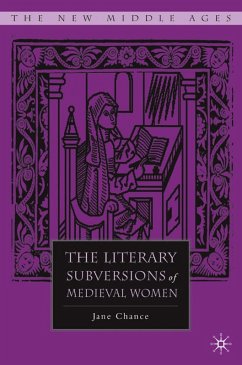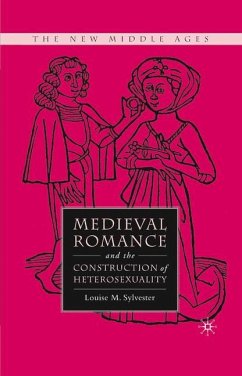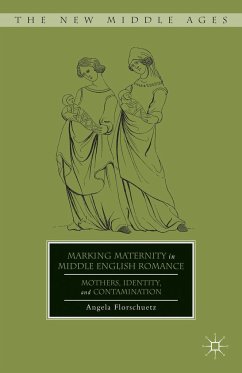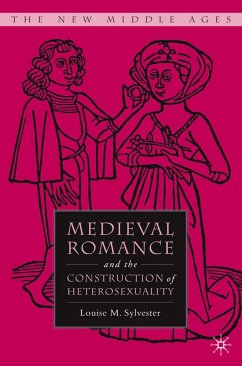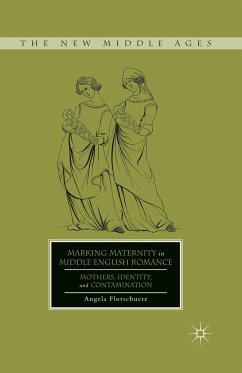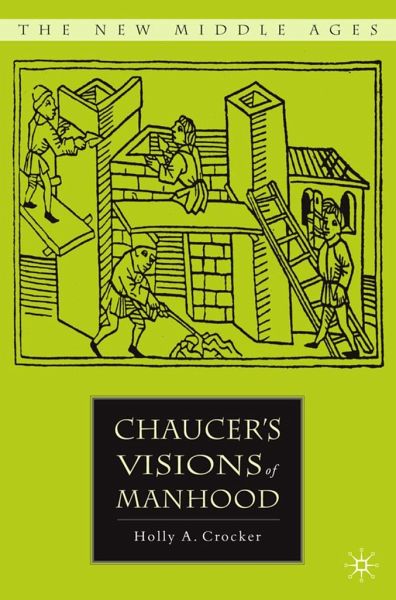
H. Crocker
Gebundenes Buch
Chaucer's Visions of Manhood
Versandkostenfrei!
Versandfertig in 6-10 Tagen
Weitere Ausgaben:

PAYBACK Punkte
19 °P sammeln!





This book argues that Chaucer challenges his culture's mounting obsession with vision, constructing a model of 'manhed' that blurs the distinction between agency and passivity in a traditional gender binary.
HOLLY CROCKER is Assistant Professor of English at the University of South Carolina, USA.
Produktdetails
- The New Middle Ages
- Verlag: Palgrave Macmillan / Palgrave Macmillan US / Springer Palgrave Macmillan
- Artikelnr. des Verlages: 978-1-4039-7571-3
- 2007
- Seitenzahl: 250
- Erscheinungstermin: 11. März 2008
- Englisch
- Abmessung: 212mm x 167mm x 21mm
- Gewicht: 456g
- ISBN-13: 9781403975713
- ISBN-10: 140397571X
- Artikelnr.: 22617056
Herstellerkennzeichnung
Libri GmbH
Europaallee 1
36244 Bad Hersfeld
gpsr@libri.de
'This is a stellar addition to the growing galaxy of books and articles on Chaucer's construction of gender. Crocker takes a fresh look at visibility and invisibility, agency and identity, transgression and performance in The Book of the Duchess and several of the narratives in the Canterbury Tales. Chaucer's Visions of Manhood is balanced, original, sophisticated, and firmly grounded both in medieval ocular theory and in the psychoanalytic and historicist theories of modern scholars. Appropriately for a book on vision and visibility, it gives us fresh insights on every page, and it leaves us, finally, with a sensible view of Chaucer-the pilgrim, the poet, and the man.' - Peter G. Beidler, Lehigh University; Editor of Masculinities in
Mehr anzeigen
Chaucer
'Not since Carolyn Dinshaw's Chaucer's Sexual Poetics has a single study revolutionized our understanding of Chaucer's construction of gender, but Chaucer's Visions of Manhood more than matches this lofty goal. Reading the privileged cultural invisibility accorded to masculinity within Chaucer's fictions, Crocker exposes the ideological inventions and subterfuges necessary to maintain gender as a regulatory system almost impervious to dissolution yet simultaneously needing endless cultural support.' - Tison Pugh, Associate Professor, University of Central Florida
'Crocker's subtle and learned illumination of the dialectics of [in]visibility that undergirds gender formation in Chaucer's poetry moves critical discussion of gender in late medieval poetry to another level. Rather than presenting a predictable analysis of Chaucer's male characters, she traces Chaucer's challenge to masculinity's [in]visible privilege in order to reveal the multiple possibilities for both male and female agency afforded by Chaucer's work. This is a book that everyone interested in historicizing theories of the gaze must read.' - Elizabeth Robertson, University of Colorado at Boulder
'Not since Carolyn Dinshaw's Chaucer's Sexual Poetics has a single study revolutionized our understanding of Chaucer's construction of gender, but Chaucer's Visions of Manhood more than matches this lofty goal. Reading the privileged cultural invisibility accorded to masculinity within Chaucer's fictions, Crocker exposes the ideological inventions and subterfuges necessary to maintain gender as a regulatory system almost impervious to dissolution yet simultaneously needing endless cultural support.' - Tison Pugh, Associate Professor, University of Central Florida
'Crocker's subtle and learned illumination of the dialectics of [in]visibility that undergirds gender formation in Chaucer's poetry moves critical discussion of gender in late medieval poetry to another level. Rather than presenting a predictable analysis of Chaucer's male characters, she traces Chaucer's challenge to masculinity's [in]visible privilege in order to reveal the multiple possibilities for both male and female agency afforded by Chaucer's work. This is a book that everyone interested in historicizing theories of the gaze must read.' - Elizabeth Robertson, University of Colorado at Boulder
Schließen
Für dieses Produkt wurde noch keine Bewertung abgegeben. Wir würden uns sehr freuen, wenn du die erste Bewertung schreibst!
Eine Bewertung schreiben
Eine Bewertung schreiben
Andere Kunden interessierten sich für




